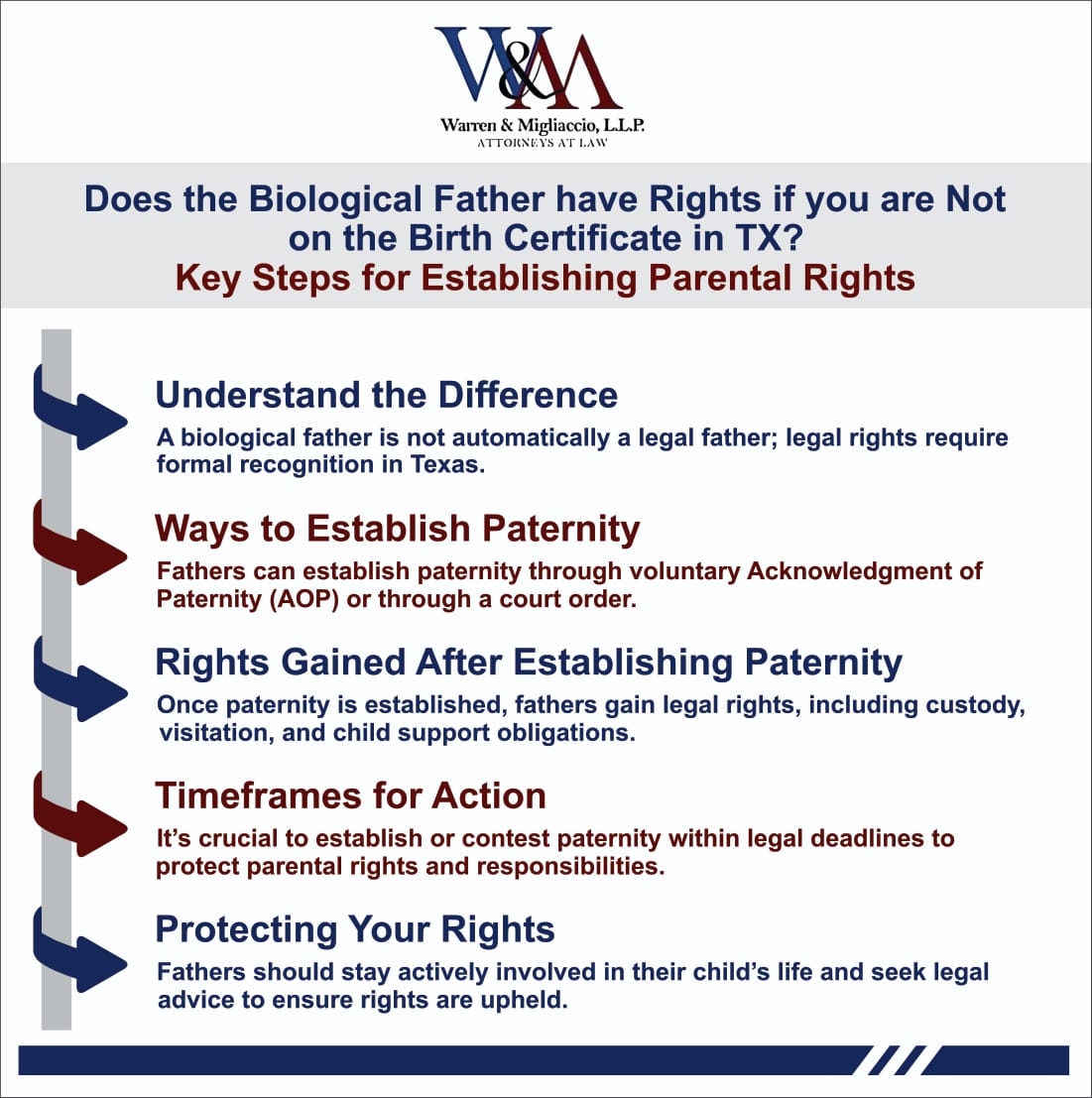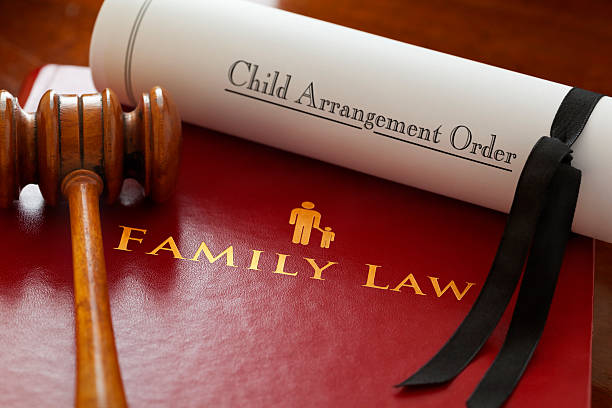Does the biological father have rights if you are not on the birth certificate in TX? This is a common question in Texas family law. A biological father’s rights are affected if they aren’t on the birth certificate. Texas law balances biological parent rights and a child’s best interest. Whether you are a father seeking rights or a mother looking for clarification, this guide is right for you.
Understanding Biological vs. Legal Fatherhood in Texas
In Texas, a child’s biological father isn’t a legal father. A biological father contributes genetic material, but this doesn’t guarantee legal rights. A legal father is the one recognized by the state and holds all parental rights and duties.
These responsibilities include custody, child visitation, child support, and decision-making about the child. Legal fatherhood establishes who is legally responsible for a child’s well-being.

Establishing Paternity: Acknowledgment of Paternity (AOP)
The most common way to establish paternity is the voluntary Acknowledgment of Paternity (AOP). This legal affidavit, signed by both parents, affirms the father’s paternity.
Once filed with the Texas Vital Statistics Unit, the father’s name is added to the child’s birth certificate. He gains rights and legal responsibilities. A paternity suit is unnecessary if both parents voluntarily agree to the AOP.
Establishing Paternity: Court Order
Sometimes, an AOP isn’t possible due to disagreements. In these situations, a court order can establish paternity. This typically involves DNA testing to confirm the biological relationship.
The court then issues an order granting the father legal rights. This route can be more complex and time-consuming than the AOP process.
Presumption of Paternity in Texas
In certain scenarios, Texas law presumes a man to be the father, even if unmarried.
As stated in Texas Family Code Section 160.204, a man is presumed the father if:
- He was married to the child’s mother at the time of the child’s birth.
- He was married to the child’s mother within 300 days before the child’s birth.
- He married the child’s mother after the birth and acknowledged paternity in writing or is named on the birth certificate.
- He lived with the child for the first two years of his life and represented to others that the child was his own.
Even with this legal presumption, paternity can be challenged legally.
Per Texas Family Code Section 160.102, the parent or the presumed father can petition the court for a paternity test.
Rights and Responsibilities of a Legal Father in Texas
Once paternity is finalized, a father gains rights, including seeking legal custody and visitation. He also has access to the child’s records. These rights come with responsibilities, like paying financial support.
Texas courts focus on the child’s best interest in custody and child support decisions.
While both parents have active roles, courts might award full custody to only one parent. This can happen if a parent is unfit due to domestic violence or child abuse. A father wanting to challenge custody should establish paternity first.

Child Support Obligations
Fathers not on the birth certificate aren’t obligated to pay child support. But, once paternity is established, child support becomes a legal obligation. Texas courts determine support based on the non-custodial parent’s income and number of children.
Time Limits for Establishing Paternity
Texas has no set time limit for establishing paternity. It’s beneficial to do so early, securing parental rights and contributing to the child’s life from an early stage. Establishing paternity as soon as possible allows fathers to engage in their child’s development.
However, challenging a presumed father usually has a four-year window, particularly when the mother was married to another man at the child’s birth.
Establishing paternity for inheritance purposes must be done within four years of the child’s death. If seeking to establish paternity to contest paternity after a child has passed, action must be taken within this period.
How Long Does a Father Have to Sign a Birth Certificate?
There is no deadline for signing a birth certificate in Texas. The father’s name must be added to the established paternity for unmarried parents. This ensures the father’s legal recognition before adding him to the birth certificate.
If paternity is established via AOP at the hospital, the father’s name is added immediately. If paternity is established later, a new birth certificate can be requested.
The Mother’s Role in Paternity Cases
Mothers play an important role in paternity cases, particularly for unmarried couples. They can decide whether to name a father and can start a legal process to establish support for paternity. A mother’s decision to seek a court order helps define the child’s legal parentage.
After establishing paternity, mothers need to be prepared for potential custody. Mothers have ways to protect themselves and their children if there are safety concerns. It is often recommended that they get the law firm and the correct managing conservatorship put in place.

What if the Mother Refuses to Acknowledge Paternity?
If the mother refuses to sign the AOP, the father must file a paternity suit to establish paternity. The court will order genetic testing.
Once the court confirms paternity, the father can assert his legal rights and establish support paternity.
Consulting a Texas family law attorney can be helpful to discuss your specific case. The law office can guide you through the complexities of the Texas family code and support enforcement.
The Impact of Paternity on Child Custody
Establishing paternity is crucial for fathers seeking custody or visitation rights. Texas courts focus on what is best for the child, ensuring custody arrangements serve their well-being. Once paternity is confirmed, fathers can petition for custody or visitation rights.
Custody decisions consider several factors. These include the child’s physical and emotional needs, the stability of each home, and parent-child relationships.
Texas courts often prefer joint custody. This allows both parents to stay involved in the child’s life and build healthy bonds. Yet, every case is different, and decisions depend on specific details. Establishing paternity should be your first step if you’re involved in custody disputes or divorce mediation.
Protecting Father’s Rights in Texas
Here are some ways fathers can protect their parental rights:
- Establish paternity through voluntary acknowledgment of paternity action.
- Be involved in the child’s life to prove a commitment to their upbringing.
- Meet any ordered child support obligations and fulfill financial responsibilities.
- Keep thorough records of interactions with the child and the other parent.
- Consult with a Texas fathers’ rights attorney specializing in Texas family law to navigate the complexities.
Rights of Unmarried Fathers in Texas
Unmarried fathers must pursue their rights, unlike presumed fathers. Without that presumed status, these fathers need proactive measures. Understanding these rights empowers unmarried fathers to take appropriate action.
Unmarried fathers have no automatic rights unless they have formally acknowledged paternity. Signing an Acknowledgement of Paternity or starting a paternity suit gives fathers legal rights.
Once paternity is established, unmarried fathers can seek custody and visitation. He can also be included in crucial decisions about the child’s upbringing. Establishing paternity also establishes child support obligations, aligning parental rights and responsibilities.

Does a Father Have Rights if He’s Not Listed on the Texas Birth Certificate?
No, an unmarried father in Texas doesn’t have paternal rights without being on the birth certificate. He won’t have official visitation or custody rights, and he cannot be pursued for child support enforcement.
Paternity is established by signing an AOP, court intervention, or meeting legal presumptions.
After establishing paternity, the parent can arrange official visitations and clarify responsibilities.
This can depend on job circumstances, like a career change or military presence. It’s better to consider estate planning, such as making decisions about asset management.
Frequently Asked Questions
Does a father have rights if he isn’t on the birth certificate in Texas?
No, the biological father of a child doesn’t automatically have legal rights if he’s not on the birth certificate. He needs to establish paternity voluntarily or through a court order.
Does a father have rights to a child born out of wedlock in Texas?
Yes, but only after establishing paternity. This can be through an Acknowledgment of Paternity (AOP), a court order, or by meeting specific legal presumptions. Until then, he isn’t legally recognized as the father. He can’t make important decisions about the child’s life, such as giving permission for healthcare.
Does signing the birth certificate establish paternity in Texas?
No, signing the birth certificate isn’t enough to establish paternity in Texas for unmarried couples. Additional steps are necessary. These steps include filing official forms and acknowledging parental status, often done at medical facilities. These legal documents need to include both parents’ names. Acknowledging both parents’ roles in the child’s life is important.
How long must a father be absent to lose his rights in Texas?
There isn’t a specific timeframe for automatic termination of parental rights in Texas based solely on absence. However, an extended absence can affect custody cases. A court may modify or terminate parental rights based on the father’s lack of involvement and other relevant factors. The court prioritizes the “best interests of the child.”

Conclusion
Navigating parental rights when the biological father of the child isn’t on the birth certificate is hard.
Understanding family laws and parental duties helps protect the child’s well-being. It also secures deserved parental involvement.
During disagreements, seeking legal counsel and exploring resources is advisable.
Our experienced family law attorneys are here to help if you need guidance on paternity issues. We can discuss your case and offer you legal advice. Call us at phone number (888) 584-9614 or contact us online to get started.

